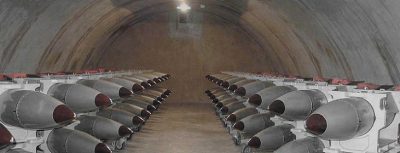Who Is Keeping the EU Hostage?

Speaking at the security conference in Munich, US President Donald Trump’s national security adviser, H.R. McMaster announced that “we will not allow Russia to hold the nations of Europe hostage.” Apparently, local media sources couldn’t come up with anything more fresh than parroting him, unleashing yet another instance of compulsive Russia-bashing, alluding that the recent drastic improvements in the state of Russia’s armed forces are somehow keeping the EU hostage. One could come across a torrent of similar articles immediately after the revision of America’s Nuclear Posture Review (NPR).
But let us inject some objectivity into the otherwise heavily propagandized matter by asking: hasn’t the US been forcing Europe to risk everything in its own little nuclear game?
It’s been seven years since the signing of the New START (Strategic Arms Reduction Treaty) initiative and both Moscow and Washington would announce that they’ve attained the stated goal of reducing the number of deployed strategic nuclear weapons. Nevertheless, today the world rather vocally protests the new nuclear doctrine of the United States, according to which it is going to seek to increase its nuclear posture even in conflicts that should otherwise remain strictly conventional in their nature. The United States has considerably simplified the criteria which enables Washington to use nuclear weapons, expressing its intention of developing smaller nuclear warheads for by both sea and land based cruise missiles.
The National Interest argues that there’s a handful of reasons for these force-structure adjustments, however even such a prolific pro-Washington mouthpiece finds itself unable to downplay the fact that the changes introduced were designed to deter the Russian government from what many in Washington believe to be a lowered nuclear threshold.
It would be added that Moscow hasn’t really lowered or raised the nuclear threshold in recent years. Yet, most people would be misled by the fact that policymakers in both Russia and the United States have different concepts about the conditions under which a conflict meets the nuclear threshold.
It’s no secret that Washington has taken every possible step to weaken, contain, and eventually bring about regime change in Moscow in favor of one that is more compliant with US national interests. It’s been noted that this goes back to NATO’s invasion of Kosovo, against fervent Russian objection. The bold steps that the United States and NATO took to bring down the Milošević government, convinced Russia’s policymakers that Washington would eagerly pursue its foreign-policy goals, while paying no heed to Russian national-security concerns.
It’s no wonder that after witnessing a string of color revolutions across Europe that came hand-in-hand with the so-called Arab Spring, there’s no persuading Moscow that somehow America would ever respect its sovereignty, dismissing the notion of national sovereignty in its meddling all across the globe. That is precisely why any step that Russia has taken so far should not be regarded as a sign of imperialist or revanchist ideas taking hold of the Russian elite, but as an attempt to defend itself from a growing external threat.
“Donald Trump does not understand the historical significance of nuclear disarmament and has repeatedly argued that during the election campaign he allegedly asked one of his advisers what an advantage the United States has in nuclear weapons if they never use it. with North Korean dictator Kim Jong-un, he boasted that his nuclear button is bigger. For Trump, nuclear weapons are an integral part of his fantasy of omnipotence,” Tagesspiegel said in a statement.
Both the United States and Russia have gone a long way on the road toward nuclear disarmament. However, now Trump has decided to send dubious signals, notes the Neue Zürcher Zeitung. Trump, unlike his predecessors, has not said a single word about his future nuclear disarmament initiative, while keeping just as silent about Washington’s intentions to extend the New START.
In one of its articles the Guardian states:
Tilman Ruff, the founding chair of the Melbourne-founded International Campaign to Abolish Nuclear Weapons (Ican) said the newly released US nuclear posture review was “a chilling document.
This increases the danger of nuclear war … it clearly flags that great power confrontation with Russia is back on again. It essentially says, ‘we’re back in the cold war’.
According to German Foreign Minister Sigmar Gabriel, Washington’s decision to develop new tactical nuclear weapons marks the launch of a new round of a nuclear arms race. Gabriel noted that Europe would be “particularly vulnerable” in this race, as it was during the Cold War. This notion is supported by the annual report of the Munich Conference, in which experts have unanimously agreed that the world has never been so helpless in the face of this new threat.
The Vice Minister of Foreign Affairs of China, Fu Ying has openly challenged Washington’s position during the Munich Security Conference, noting that Beijing can’t be any more surprised to hear Washington accusing other states of presenting a nuclear threat, while it itself adjusts its own nuclear strategy in a rather unpleasant manner.
The whole conference can be summarized with a statement made by a Swiss jurist, Beatrice Fihn, who warned all participants of the Munich conference about the possibility of new accidents, noting that the world cannot always count on luck, as, statistically speaking, something terrible would happen sooner or later. However, Washington apparently couldn’t care less about Europe and its security, as it continues accusing Russia of holding it hostage to a nuclear threat.
*
Martin Berger is a freelance journalist and geopolitical analyst, exclusively for the online magazine “New Eastern Outlook.”
Featured image is from the author.

